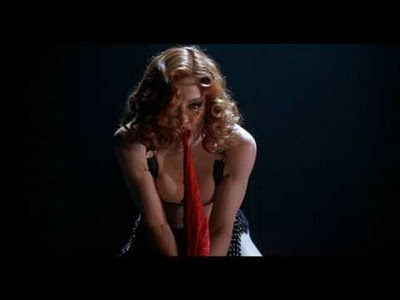This is a guest review by Clint Waters.
“From just some dumb mechanic’s wife, I’m gonna be Roxie. Who says murder’s not an art?”
Roughly ten years ago, the Broadway musical Chicago was adapted for the silver screen by Bill Condon and directed by Rob Marshall. This film is oh-so appropriate for Women and Gender in Musicals Week because it explores the darker side of an era when First-Wave Feminists had recently won the right to vote and were continually fighting for equality. However, instead of picket lines and hunger strikes, the women of Chicago manipulate sexuality and violence to gain the upper-hand over their male counterparts and for a myriad of other less-than-pure intentions.
Roxie Hart, our lady protagonist played by Renee Zellweger,
dreams of stardom and celebrity whilst toiling away the hours at home as a housewife. For this reason, the songs and dances within Chicago take place on the fantasy stage within her mind. She enters into an affair with a man who says he can get her into show business. However, the deal goes sour. Very sour. Eventually, he tires of her constant hints and nudges and reveals he was just stringing her along to get into her flapper dress. She proceeds to shoot him with her husband’s gun, wailing “You lied to me!” This begins a trip down a glitzy yet slightly sleazy rabbit hole of fame. Apparently, before television, the citizens of Chicago relied on actual murder stories and court hearings for their daily dose of drama. For this reason, Roxie’s trip to the Cook County Jail provides her a slew of new murderous friends, including Vaudeville star Velma Kelly (played by Catherine Zeta-Jones).
Roxie also crosses paths with Mama Morton (played by Queen Latifah).

Mama Morton is a fascinating facet of femininity, as she appears motherly and kind. However, not long after meeting her do we find that she manipulates her inmates’ needs for affection and contraband (cigarettes, magazines, etc.), as well as the city’s desire for court drama by charging the murderesses for phone calls to lawyers. As her big solo song goes, “When you’re good to Mama…Mama’s good to you.” She is a shrewd businesswoman to say the least, allegiances and favoritism leaning where the money flows.
An unforgettable number, “The Cell Block Tango,” occurs during Roxie’s first of many nights in Jail. As the lights go out and she sobs herself to sleep, the cells come alive with individual sounds that form a Stomp-esque intro to the song where several inmates detail what brought them there. Each of them is in for the murder of a lover or husband.
Here, we have an interesting blend of shades and hues labeled “femme fatale.” Most are revealed to have killed for seemingly silly reasons and others for being scorned by adulterers. What makes the number unforgettable is their sheer crassness toward their victims, yet they still cling to their pleas of not guilty: “I didn’t do it, but if I done it, how could you tell me that I was wrong?” This scene also has some very striking visuals and imaginative uses for red cloth representing blood/death:

(“Some guys just can’t hold their arsenic.”)
Not that female murders are anything new, but I enjoy that Chicago features nothing but. While we’re on the subject, there are exceedingly few main male characters in the film (one being Roxie’s dope of a husband and the other being a smarmy lawyer out for money), which is awesome and doesn’t happen all that often in movies dealing with murder. Let alone a musical movie dealing with murder. However, where I believe the film falls short is the fact that none of these characters has redeeming qualities. Although lovable and down-right cool for their sass and attitude, the main three women of the film don’t really have that much depth. Both Roxie and Velma have committed their crimes, but the film reveals them to be less bloodthirsty killers and more attention-grabbing children. All of their actions are motivated by this desire to hog the spotlight. One scene has Velma asking Roxie to do a duo act with her, which could be seen as a bit of verisimilitude, but it’s really just her pining after Roxie’s soaring fame. Eventually, in the end, the two girls learn to get along and reap the benefits of being accused of murder and getting away scott free…which is oddly to become stars of the stage what kind of people lived in 1920’s Chicago anyway?!).

However, this is a cheap bit of characterization and more of a resolution to their movie-long catfight than it is anything deep.
I don’t mean to say that I dislike this movie. In fact, you will never hear me say that. I LOVE this movie. Although it may not be the deepest of films, it knows what it is and does it well. Aesthetically speaking, it is a gorgeous film with gorgeous women and takes a lot of strides to make everything look and feel Vaudevillian. As I mentioned earlier, the songs take place in Roxie’s mind, so the creative directors spared no expense on blending stage effects with surrealism. (For example, the audience, while played by real people, sits motionless like wax figures because after all, the show is about Roxie. In another scene the members of the media are literally represented as the puppets that they are.)
Personally, I enjoy the fact that it is a female-centric film that doesn’t fall into the Chick-Flick, Feel Good or Romcom genres. It’s about women who know what they want and beg, borrow, steal, sing and kill to get it.
———-
Clint Waters is a creative writing major, German minor at Western Kentucky University. He is in his final year and hopes to pursue any career that remotely deals with writing in a creative fashion. Visit his blog at
redintooth.tumblr.com.







1 thought on “Women and Gender in Musicals Week: ‘Chicago’”
Comments are closed.